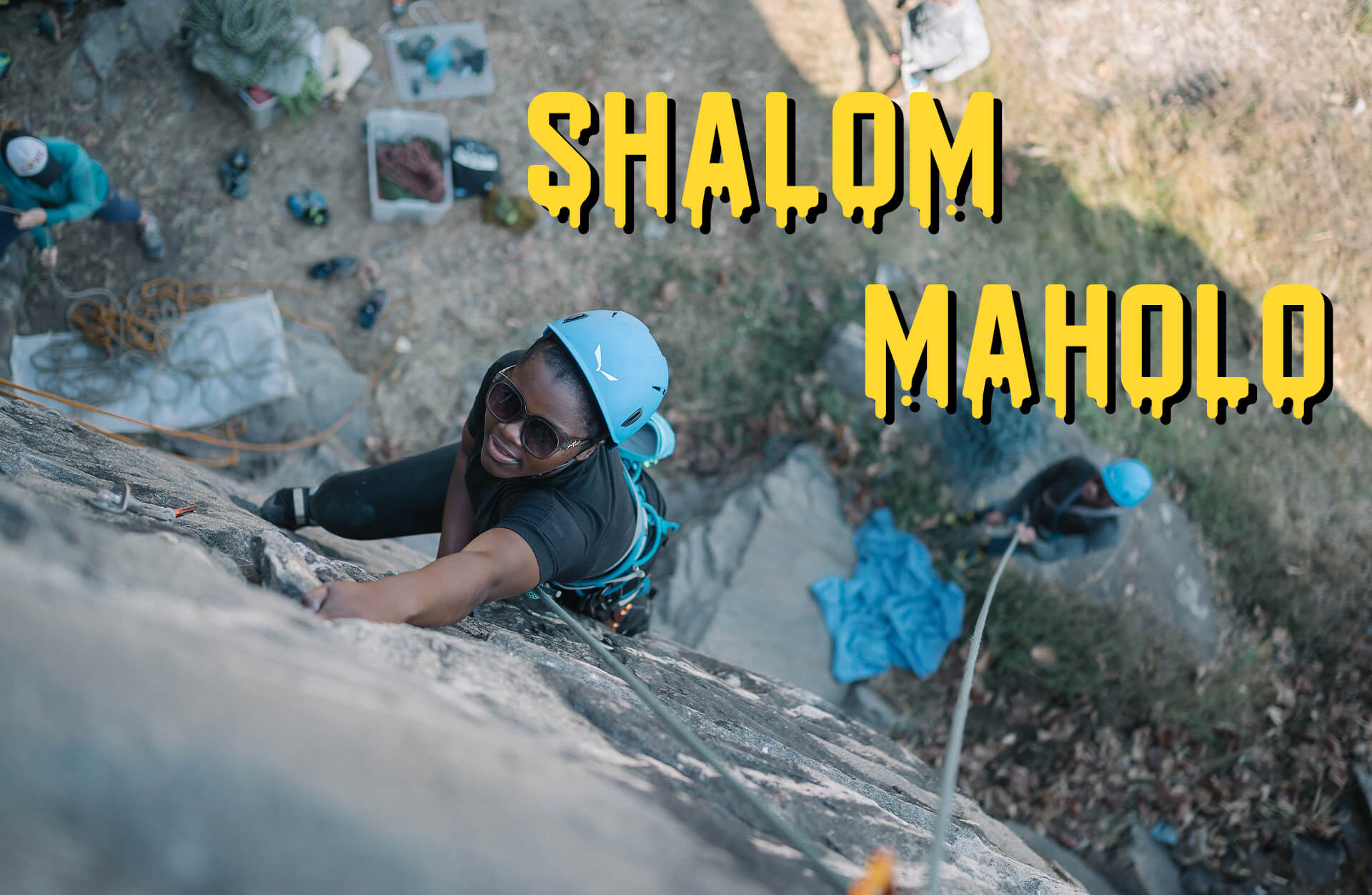CLIMB // 03 SEP 2024
FIRST ASCENTS: ZIKOMO
Tucked away into the southeastern part of Africa, the landlocked country of Malawi is perhaps not the first destination on a climber’s bucket list. But with ample granite domes, cliffs, and boulders, Malawi brims with potential. However, as any local climber will tell you, including young Shalom Maholo, the first Malawian woman to bolt and name a route, the best part of climbing in ‘the warm heart of Africa’ is the people.
It was that welcoming community that initially brought climbing into Maholo’s life. Her first time at the crag was as a tag along with a friend who was shooting a documentary for the local climbing non-profit, Climb Malawi. “I went there. I saw people climbing. It [didn’t] excite me much,” recalled Maholo. “Then Ed, [a board member of Climb Malawi], asked me to climb with them and try it out, I was like, why not?”
Maholo grinned, “It was fun. On the first day everybody was so friendly. We connected in an instant. It was like we’d already known each other for a very long time. [Then], when I climbed, I was so motivated. People were like, ‘You’re doing so great!’ Everybody made sure that I didn’t feel left out. [After that] I was like, you know what? I feel like this is my thing. I feel like I can do this.”
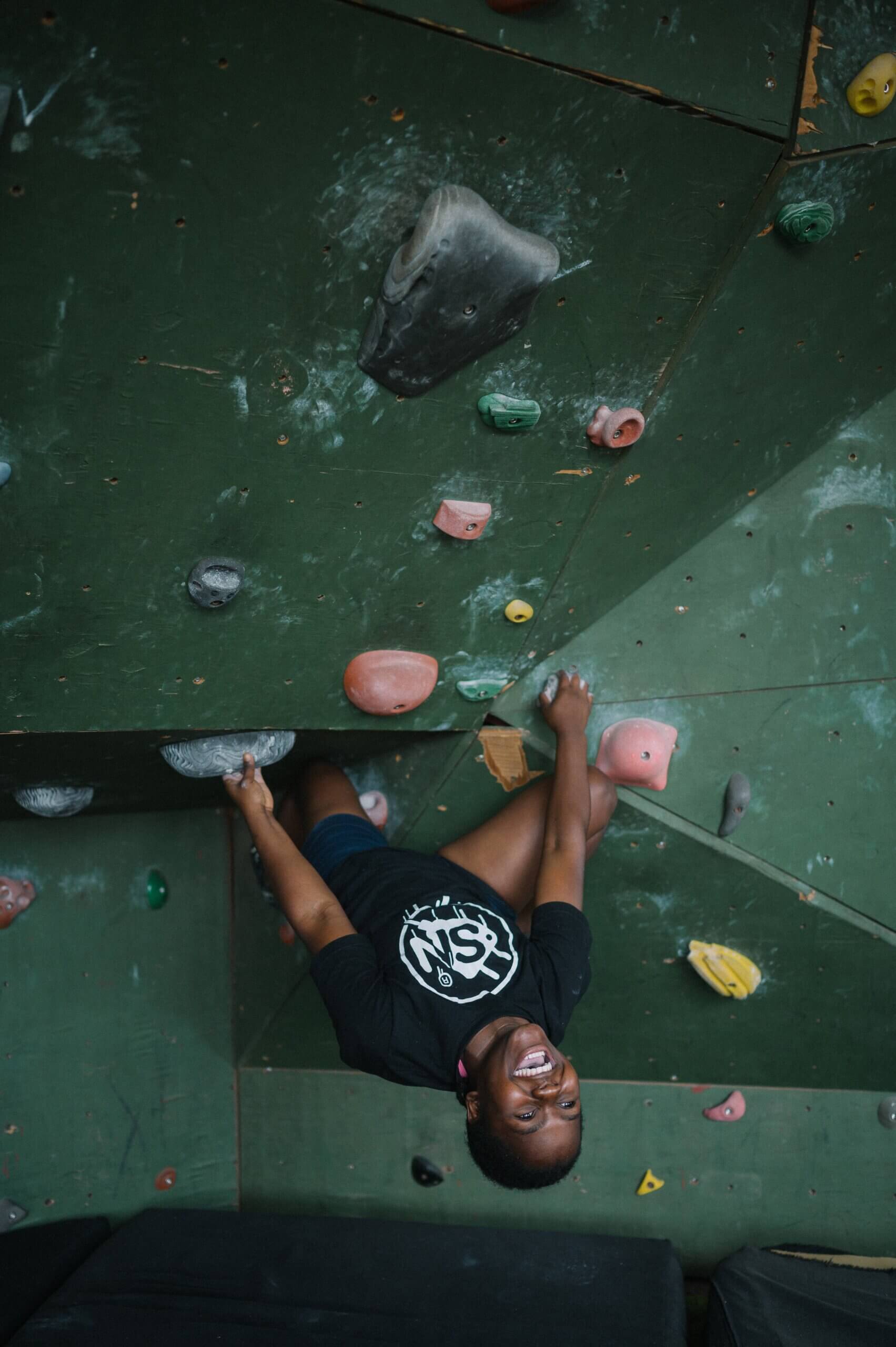
It didn’t take long for Maholo to immerse herself into the Climb Malawi community, eager to learn anything and everything she could about the sport. “I just wanted to know all about it,” said Maholo. “When I would see [someone do] something, I would ask, ‘Can you teach me how to do this?’ I would give my whole attention to it.”
She laughed as she recalled, “In my early days, I saw one of the climbers lead climbing. I didn’t know what lead climbing was, but I felt like I could do it. Then this one time my friend was climbing and he reached [a move] he couldn’t do. I was like, ‘You know what? Just come down. I’ll do it. I’ll do it. I’ll do it.’”
Maholo’s climbing companions managed to keep her from scrambling up the wall, encouraging her to first complete a lead climbing course. Though frustrated in the moment, it was simply more fuel to her climbing fire.
Climbing gear is a costly investment, and with over half the population of Malawi living in poverty, it becomes clear that the reason it took so long for the sport to get established was a lack of resources. Shoes, harnesses, rope, ATCs, transportation, and perhaps the most valuable, knowledge.
Butter Mag is a 100% reader supported publication. By subscribing to Butter’s Patreon for as little as 2$/month, you keep Butter churning, so that together we can create a more diverse outdoor sports community.
“I should say thank you to [Global Climbing Initiative (GCI)] and Climb Malawi for organizing that clinic,” said Maholo. “We knew the basics of climbing, [but] then the GCI team really sharpened us to a point where we know so much now. I’ll give an example, I used to hate GriGris. I was like, this thing is just so complicated. I preferred using an ATC. GCI, they said, ‘No this is more advanced. You should know how to use this.’”
She continued, “As an upcoming community, we’re getting information not just for us, but for the future generations. So [to have] people from different continents coming in to teach us things, it’s really nice. Because we learn how people climb there, how their culture is, how their community is, and then we are also sharing the information we’ve learned with them.”
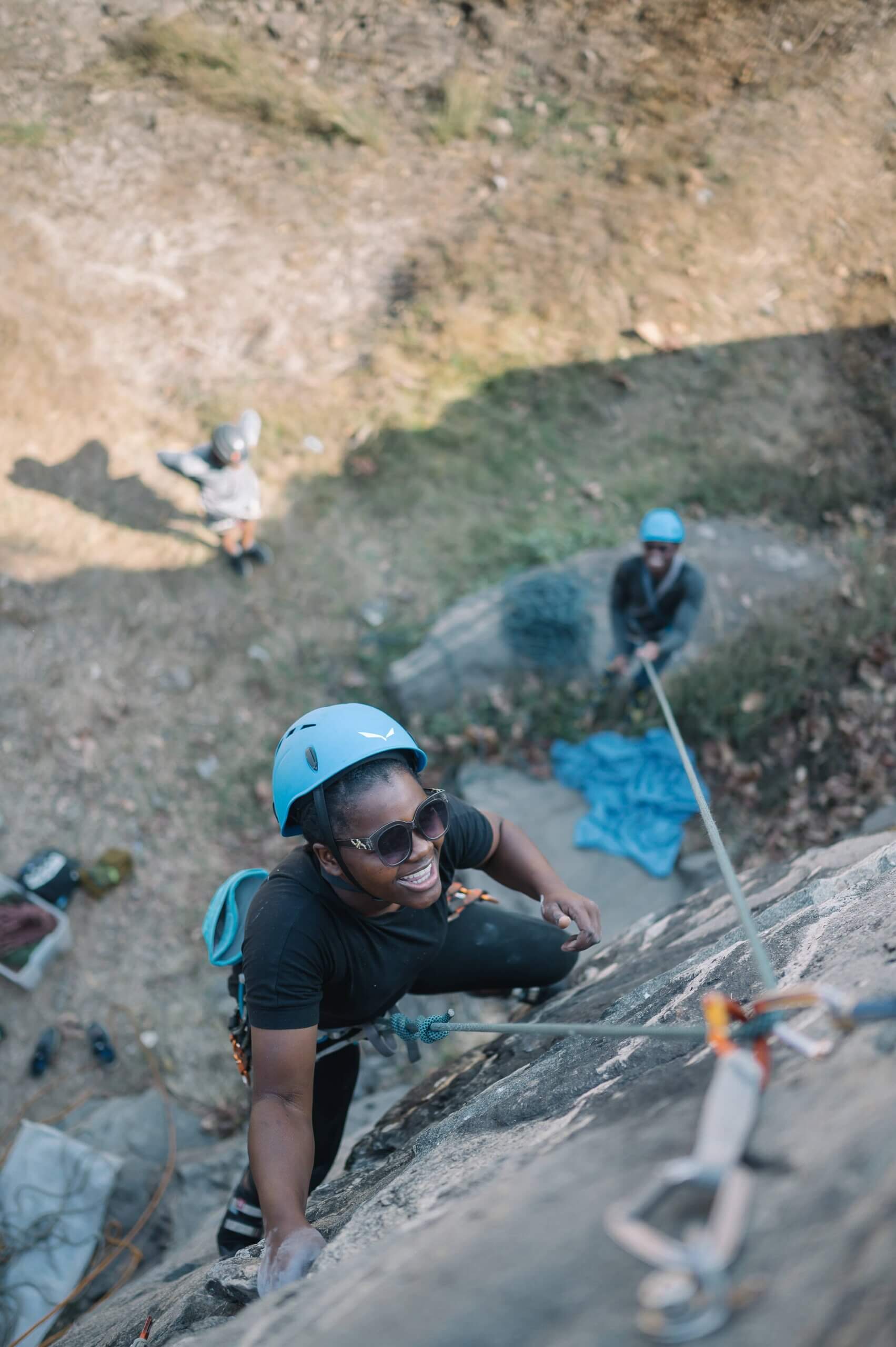
It was during one of those clinics that Maholo found her maiden route. With only one local climber bolting routes in the area, Maholo took the initiative to learn the skill as well. “It’s a lot of work!” she said. “It couldn’t just be him doing all this work. I just wanted to help out. [Plus] what if he goes away at some point? Who’d [take over]?”
Armed with her new bolting skills when the GCI team came to visit, Maholo spent the clinic, well, not doing a whole lot. The leaders were focused on getting the participants up to Maholo’s skill level, which meant she spent most of her time on the sidelines watching.
“I think Mario saw that I was a bit bored,” laughed Maholo. “He said, ‘You know Shalom, can you go around the hill? I have seen a line, I want you to go and find the line I’ve seen. Don’t look for the hard stuff. Go look for the obvious things.’”
That line is now better known as the 5.8+ route named Zikomo, meaning “thank you” in Chichewa. The climb marks both an important historic moment, the first route bolted by a Malawian woman in the country, but also a key moment in Maholo’s own personal growth.
Enjoying this article? Consider subscribing to our Patreon for as little as 2$/month to ensure we can keep sharing more stories like this in the future!
“Climbing has really helped me so much,” she said, a wistful look in her eye. “I’m naturally a shy person. But then climbing, I got to the point where I’m [now] an instructor. I have to communicate. So that got me out of my comfort-zone.”
She continued, “Also I grew up with low self-esteem. I believed in myself, but not as much as a person is meant to believe. But when I started climbing, getting compliments, [plus] the vibes climbing gives you, that really boosted my self-esteem. Now nobody can tell me I can’t do something.”
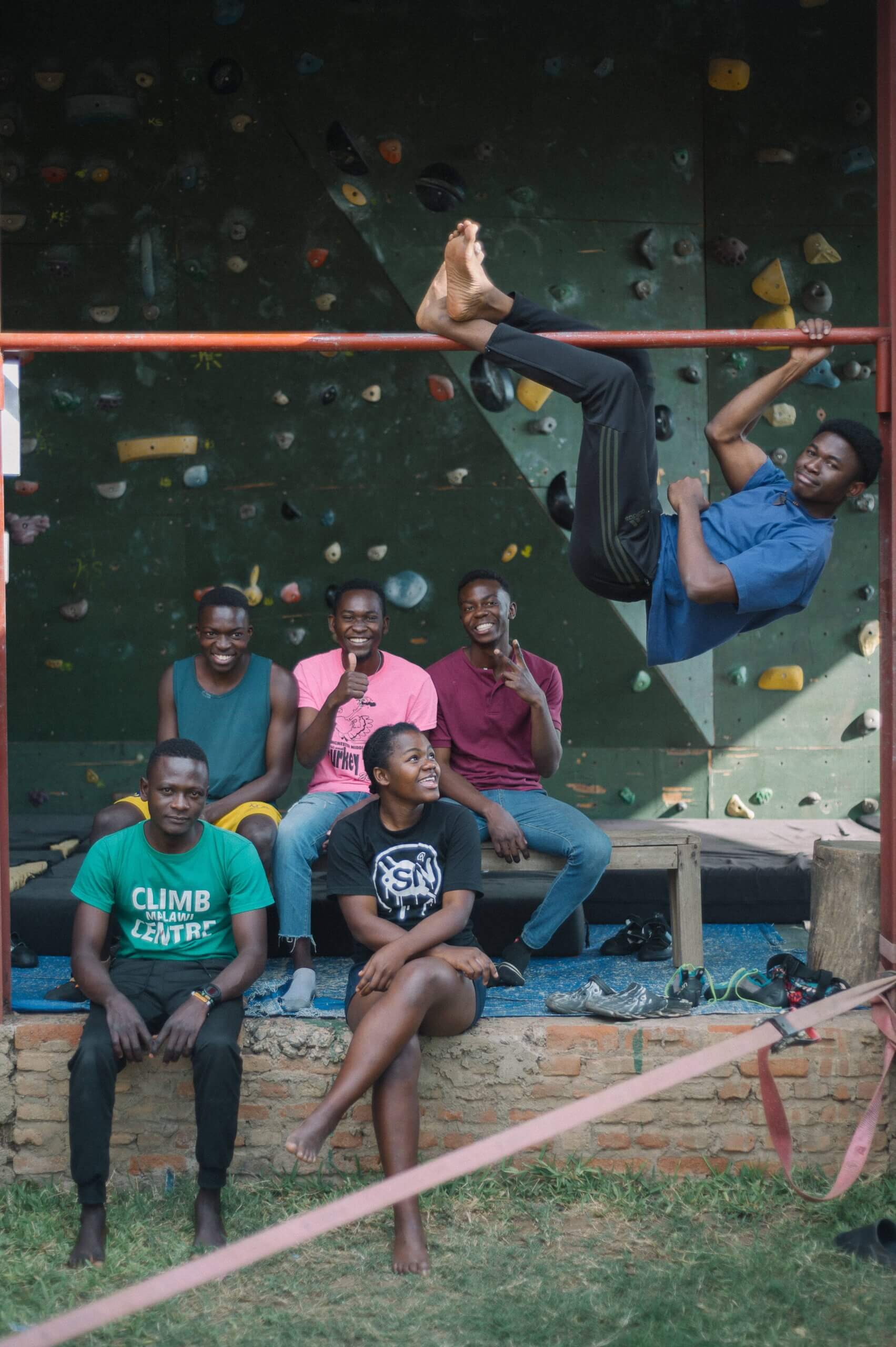
This self-assurance amplified as Maholo stepped into a leadership role at Climb Malawi. Tasked with planning a climbing trip, the 22 year old learned how to manage a team, a project, and time. For Maholo, climbing is more than a sport, it’s how she’s come to find and grow into herself. “Climbing has helped me so much and changed my life to a point where, if it wasn’t for climbing, I don’t know where I would be.”
It’s for these reasons that Maholo wants to see more local women join the climbing community. Sharing her ascents online, she hopes to show other women who struggle with self-doubt that climbing can be for anyone. “We [often] see climbing as a male dominated field,” she explained. “It’s one of the biggest challenges I meet as a female climber. People see me going [to the crag] and think I’m going for the boys,” she laughed. “Not true.”
“I want more women climbing to change how society expects us to see ourselves and how society expects us to behave. Lowering ourselves down. I want more ladies in climbing because it helps change your mindset. I want us to think more of ourselves, to challenge ourselves. To be strong in so many different ways.”
Of course Maholo’s other goal is the same as all local climbers in Malawi, to see Climb Malawi grow and put the country on the map of top climbing destinations in the world. “People should plan, Okay this year I’m going to go to Malawi and climb with Climb Malawi,” she grinned. “We want to make Climb Malawi a tourist place for everyone, so Climb Malawi can give more opportunities to young leaders and create more jobs for young people so everyone benefits.”
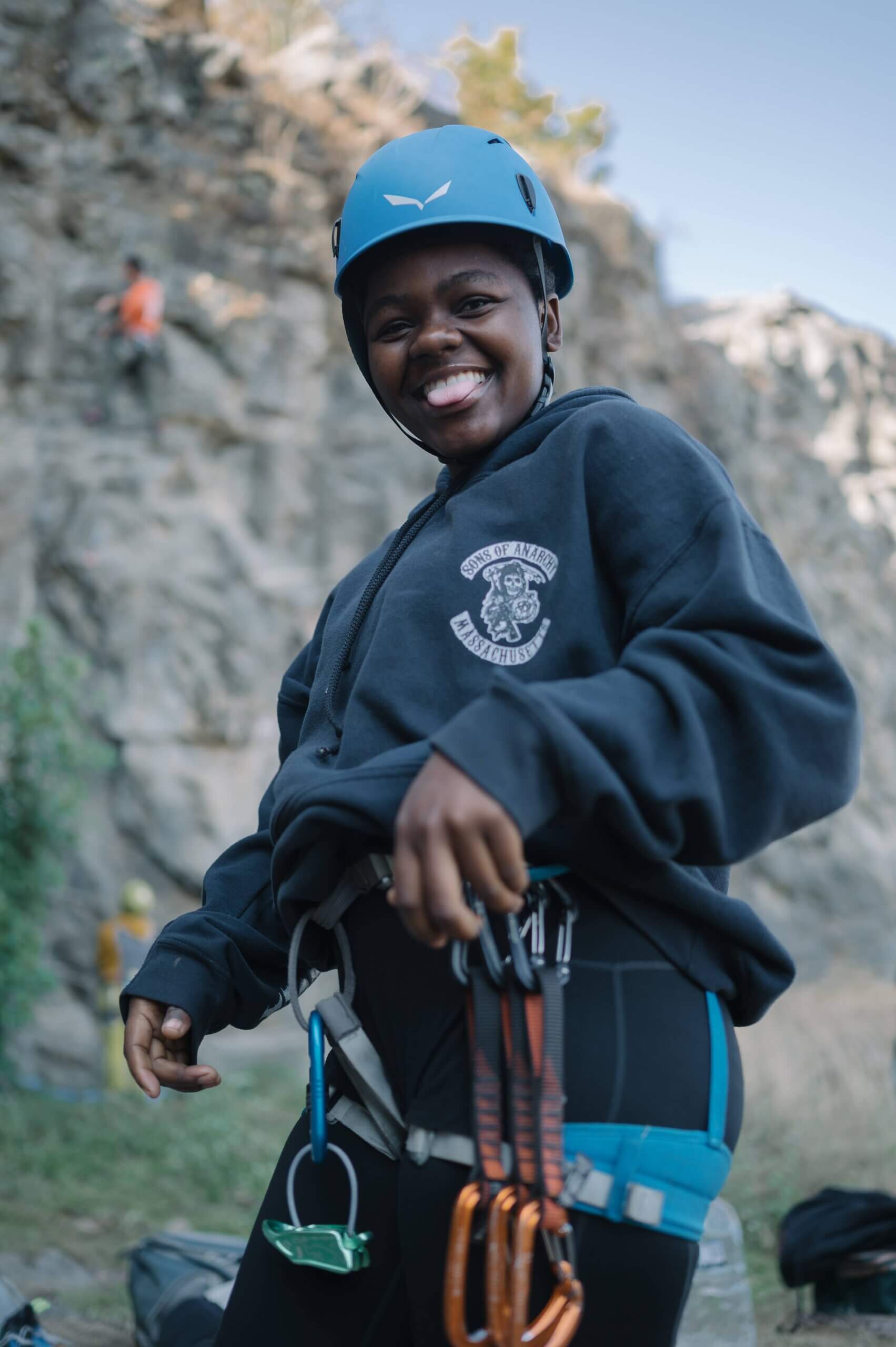
Unfortunately right now, that growth is entirely dependent on donations and sponsors. From the technical supplies such as quickdraws and ropes, to reliable transportation to get the climbers from the city to the crag. This support, while much appreciated, is inconsistent. Plus for an ambitious climber such as Maholo, getting gear that not only fits, but also fulfills specific athletes needs, such as a gym shoe versus an super aggressive overhang shoe, is important.
“I remember this one time my shoe was worn out and I went climbing with this other climber and then he saw my shoe, was like, ‘Oh, no, Shalom, you’re not serious.’ I’m like, ‘Hey, come on,’” she laughed. “There was a time also where I had to climb with one shoe because the other one was way too worn. When I was climbing, I ended up with my toe pointing out. [So when] we had a bunch of donations of shoes, I was so excited. I ended up going there, and almost each and every shoe was a kid’s size.”
So the Climb Malawi crew works hard, building a team of guides and promoting the beauty of Malawi’s unexplored climbs as much as possible. While the primary goal is to stimulate the local economy, there is perhaps a somewhat selfish hope among the Malawian climbers that they will be able to someday grow the local climbing culture independent of sponsors, and buy shoes that fit.
For any climbers interested in visiting the up-and-coming climbing destination, Maholo assures them that they will have the time of their lives:
“Peter, from Kenya, came I think a few weeks ago. It was me who was picking him up from the airport. I’m like, ‘You know what, Peter? I know you’re here to climb, but tonight we are going to party.’ Then the next day, ‘Okay, we can go climbing now,’” she laughed.“When you come here to Malawi, we will not take you as an outside person. We will take you as one of us. [As though] we have met a long time ago, [instead of] us meeting you for the first time. We love fun. [We’re] not looking at who you are or where you’re coming from. We just take you as one of us and you’re just here to have fun with us. We are full of good vibes. Climbing with us, we’ll give you the best vibes, the best vibes, and also the best climb.”
